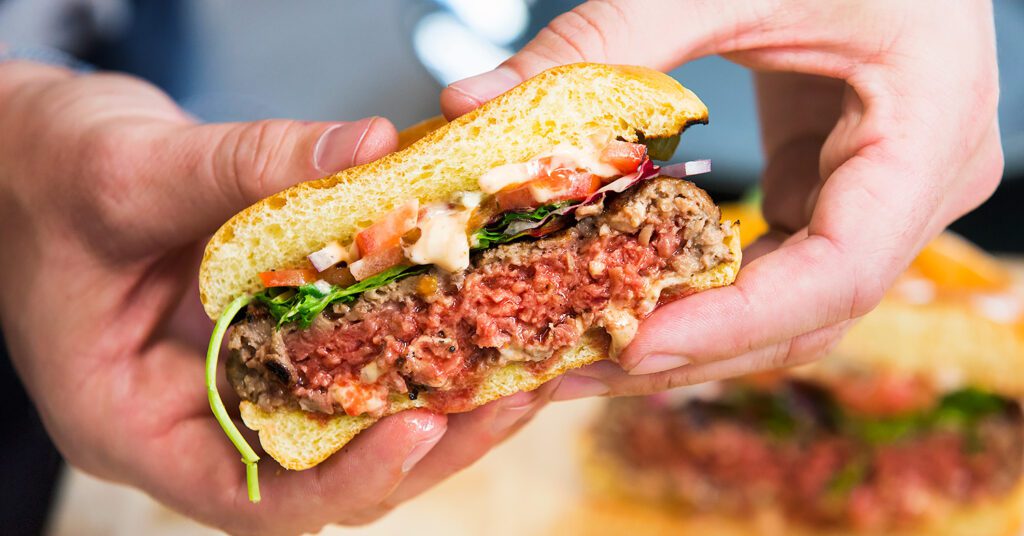Impossible Foods has sued food technology company Motif FoodWorks, claiming that the start-up’s new heme ingredient is too similar to its own.
When the Impossible Burger debuted in 2016, headlines were quick to hone in on one detail: it looked, cooked, and tasted like meat. This was all thanks to Impossible’s star ingredient, heme, an iron-rich protein that gives meat its distinct, savory flavor and aroma. It’s why Impossible burgers stay pink in the middle when cooked, and it gives them a juicy flavor.
Up until recently, heme made its products stand out against the frozen plant-based burgers of the 1990s. But, it motivated plenty of other companies—ranging from meat companies like Smithfield Foods to grocery chains like Trader Joe’s—to develop their own meat-like burgers.
The lawsuit, which Impossible filed in Delaware federal court on Wednesday, asks the court to prohibit Motif from selling the new ingredient in question, called Hemami. Motif launched the yeast-derived heme protein designed to provide plant-based meats with an umami flavor last December.
The lawsuit evokes a lot of questions. But the biggest one is: Should this serve as a reminder to all of us that the bottom line for all companies, despite sharing a common goal to make the food system more sustainable, is profit? Maybe. It’s hard to not recall Impossible Foods’ CEO and founder Pat Brown telling Yahoo finance that Beyond Meat, which also gained fame for its realistic texture, “is not our competition, and I wish them nothing but success.” So, what’s changed? It could be that the well-wishes were because Beyond doesn’t use heme in any of its products, but Motif does.
Impossible produces its heme, which it obtained a patent for in 2020, using a proprietary strain of genetically modified yeast that produced the iron-rich molecule through a fermentation process. Impossible claims that Motif has “had opportunities to obtain non-public information” regarding how Impossible’s heme is made. But, while both companies produce heme using a similar method, Motif’s is made from myoglobin (a protein found in cow muscle tissue) and Impossible’s is made from soy leghemoglobin.
Fermentation is a fast-growing field in the plant-based food industry. So, Impossible’s goal could be to forewarn emerging companies to not step on its ever-expanding, heme-based turf.

Why is Impossible Foods suing another company?
Boston-based Motif makes ingredients that improve the taste and texture of plant-based foods, such as its Hemami or its dairy-free cheese technology. It does not make or sell products, but it could supply other plant-based food brands with its ingredients. According to Impossible’s 14-page complaint filed in Delaware federal court on Wednesday, by offering Hemami, Motif “actively encourages its business partners to make, use, sell, and/or offer for sale” of what it calls the “Infringing Burger.”
“We applaud other companies’ efforts to develop compelling plant-based products, but we do not tolerate attempts to undermine our brand or products through the deliberate and unauthorized infringement of our intellectual property,” Impossible said in a statement.
Valued at $9.5 billion, Impossible’s products are available across the US, Canada, Hong Kong, Macau, Singapore, Australia, New Zealand, and the UAE. Founded in 2019 as a spin-off of the biotechnology company Gingko Bioworks, Motif was valued at $1.23 billion last year. When the smaller company launched, Gingko co-founder Jason Kelly told CNBC that he was inspired by Impossible’s success.
Impossible Foods has demanded a jury trial, claiming that the alleged infringement on its heme has “irreparably harmed” the company. Last year, Brown said that the company is open to selling or licensing its proprietary heme ingredient to other food companies, according to FoodNavigator. “We just haven’t had the bandwidth to really think about those alternative business models,” he said.

The battle over IPs
“This complaint is not supported by facts or the law and is nothing more than a baseless attempt by Impossible Foods to stifle competition, limit consumer choice, and impede Motif, a new and innovative company with significant business momentum,” Motif said in a statement. The company intends to contest the allegations “vigorously” and continue to “pursue our go-to-market strategy and work towards our mission to bring better tasting, nutritious and sustainable foods to the world.”
So far, Motif has demonstrated what Impossible claims is a “replica” plant-based burger at trade shows, such as Natural Foods Expo West. It also sold a Hemami-infused plant-based burger at Coolgreens, a restaurant chain with a location in Dallas, Texas, in summer 2021.
This isn’t Impossible’s first lawsuit against a competitor. In June 2020, it won a lawsuit against Nestlé, the world’s biggest food and beverage company, over the Incredible Burger sold under its plant-based Garden Gourmet brand. Last week, FoodNatigator broke the story about a heated dispute between two fungi-based startups: Colorado-based Meati Foods and California’s The Better Meat, which are filing lawsuits against each other. In this case, Meati claims that a former employee stole its IP and brought it to Better.
Competition is seen as healthy in any market. But as the alternative protein market heats up, we may see more companies become tangled up in battles over patents, which are designed to protect the holder’s economic interests. At the moment, there’s no telling what the end result of the lawsuit will be. Right now, we can only wait and see how it unfolds.


